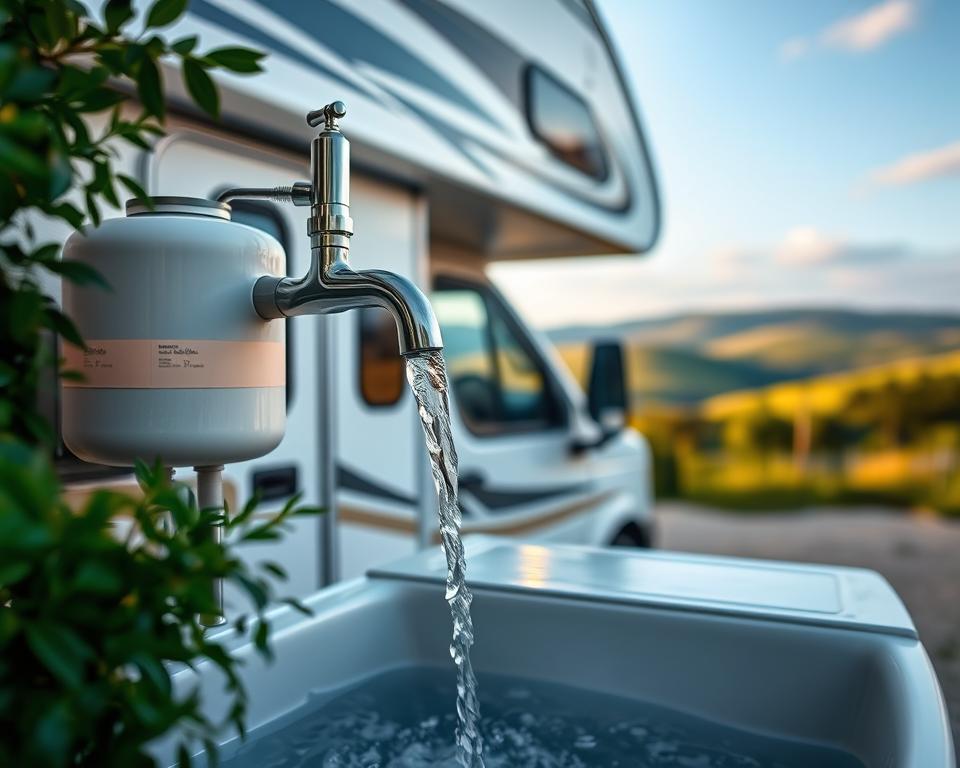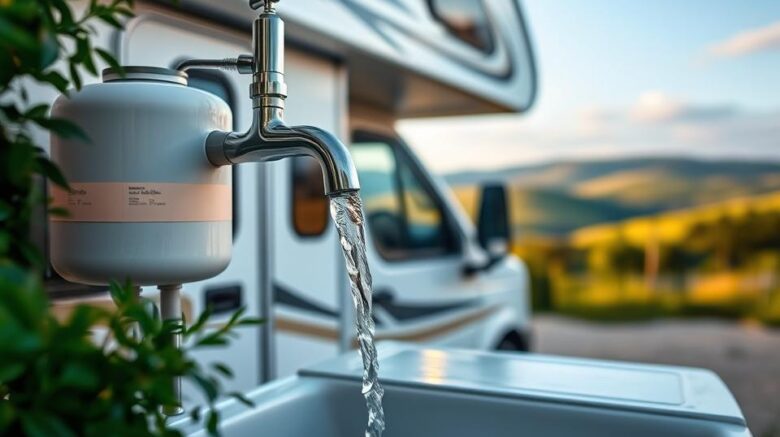RV Waste Removal: Your Guide to Effortless Dumping
Have you ever pondered about your RV’s waste management during outdoor getaways? Septic servicing matters greatly, often more than you think. Ensuring your rig’s sanitation system functions properly is essential for smooth travel. This guide explains RV waste systems, why tank emptying is necessary, and top tips for stress-free excursions. With grey water tank pump services from All in Sanitation, you can focus on exploring, not emptying tanks.
Primary Conclusions
- Grasping RV sewage setups is essential for proper tank emptying.
- Routine tank emptying avoids unexpected issues on the road.
- Best practices can extend the life of your RV’s plumbing system.
- All in Sanitation provides reliable recreational vehicle septic services.
- Monitoring tank levels guarantees a smooth RV adventure.
- Eco-friendly dumping practices reflect good RV stewardship.
Getting to Know RV Sanitation Systems
RV waste systems are essential for efficient waste management on the road. They include black and gray water tanks. Black water tanks handle sewage from the bathroom. Meanwhile, gray tanks deal with wastewater from sinks and showers. Understanding how each tank works enhances your disposal process.
It’s critical to maintain these systems properly. Failing to pump the camper tanks regularly can cause clogs. Potentially ruining your outdoor excursions. Perform routine inspections to maintain optimal performance.
Relying on a reputable black water provider ensures correct dumping. Specialized RV treatments extend tank longevity and prevent odors. Proper care of your waste system boosts your RV experience significantly.
Why RV Septic Pumping is Essential
Routine septic service ensures a clean and efficient RV. Ignoring tank emptying can cause odors, clogging, and costly repairs. Waste buildup is a health hazard due to bacteria and contamination. Keeping up with maintenance is thus crucial.
Choosing All in Sanitation guarantees green, compliant dumping. Their expertise guarantees safe, efficient handling of your waste. Regular septic system care prolongs your travel joys without waste concerns. This practice preserves your adventures by sidestepping septic pitfalls.
How Often Should You Pump Your RV Septic?
How often you empty tanks influences your RV’s sanitation. Regular timing avoids travel interruptions. Several factors affect how often you should pump: the number of people using the RV, tank size, and usage frequency.
For occasional RV users, it’s best to pump the black water tank every 3-5 days. Full-time RV dwellers might need to pump more often due to more waste. Monitoring tank levels closely can improve your maintenance routine significantly.
Using tank treatments helps you gauge emptying times. Following these guidelines protects your sanitation apparatus. Preventing tanks from overflowing not only keeps your environment clean but also prolongs the plumbing lifespan of your RV.

RV Waste Emptying Techniques
Several effective methods exist for RV septic pumping, catering to different preferences. Maceration uses a pump to liquefy solids creating a slurry for easier disposal. This facilitates easier disposal at dumping stations or designated areas. Many choose it for its speed and simplicity.
Residential dumping routes your RV waste into your home septic. It’s essential to verify local regulations to avoid non-compliance with waste disposal laws. This method is both environmentally safe and directly manages RV waste when properly used.
Gravity dumping uses gravitational force to release waste into a cleanout port, being the most straightforward method. All dumping options have advantages and drawbacks. Knowing the differences helps you pick the right approach for clean and efficient disposal.
RV Septic Pumping Equipment and Tools
Proper equipment makes tank emptying easier. A durable sewer hose links your RV to disposal sites. Flexibility and strength are crucial qualities. Quality hoses turn dumping into a quick task.
Include a macerator pump in your gear list. They convert solids into liquid for easier dumping. Ideal for low-lying dump points.
Keep your waste tools in top condition. Always clean hoses and tools post-use to avoid contamination. Proper storage guarantees readiness. Well-maintained gear ensures clean and smooth emptying.
Optimal RV Waste System Care
A tidy waste setup makes camping more enjoyable. To ensure this, it’s important to adopt best practices for RV sewer cleaning. Start by always dumping black water first, then follow with gray water. This process uses the cleaner water to flush out the tanks, preventing clogs and buildup.
It’s essential to use bacteria and enzyme treatments for effective wastewater management. These treatments naturally break down waste, fostering a healthier septic environment. Stay away from harsh chemicals as they can kill the beneficial bacteria, reducing the system’s effectiveness.
Consistently rinsing tanks, hoses, and connectors is key to avoiding odors and blockages. Employing a dedicated sewer hose for black water use is a wise choice. This habit enhances overall sanitation hygiene.
To ensure best practices are consistently followed, adhere to this checklist:
- Dump black water first, then gray water.
- Use enzyme and bacteria treatments regularly.
- Skip bleach and strong disinfectants.
- Flush all components post-dumping.
- Perform periodic system inspections to spot problems.
By adopting these habits, campers enhance system longevity. This leads to more enjoyable road trip experiences.
Maintaining Your Mobile Home Septic
Similar to RVs, mobile homes need regular septic care for lasting performance. Regular upkeep prevents expensive repairs and guarantees a working septic system. A routine pump every 3–5 years suits most setups, based on usage and capacity.
Proper dumping techniques protect your septic infrastructure. Only introduce safe, approved substances into the system. To reduce damage, use biodegradable products and keep an eye on tank levels. Steer clear of damaging cleaners that kill beneficial bacteria.
Arrange periodic expert check-ups to spot issues before they escalate. These check-ups ensure your peace of mind by identifying issues before they worsen, thus maintaining smooth operation. Following these guidelines keeps your home septic in peak shape.
Trailer Wastewater Disposal Tips
Effective trailer wastewater disposal is essential for a smooth RV experience. Start by finding designated dump stations on your route. Make sure these spots comply with local laws to avoid fines and environmental damage. Using camper-safe solutions boosts tank health and dumping ease.
Utilizing freshwater is crucial in the disposal process. A thorough rinse eliminates leftover sludge. Residual waste leads to smells and clogs. Moreover, it supports an eco-friendly disposal method.
Advance planning is vital. By organizing your stops at disposal stations as per your travel plans, you can reduce hassle. Coordination makes emptying more efficient. Some useful tips for waste disposal include:
- Regularly monitor tank levels to decide when pumping is needed.
- Use bio-additives to accelerate breakdown and maintain tank health.
- Protect yourself with gloves and sanitization after handling equipment.
What You Need to Know About Holding Tank Treatments
Efficient waste management in motorhomes relies heavily on proper RV holding tank treatment. Formulations contain targeted microbes and enzymes. Designed to decompose solids efficiently. Consistent use curbs odors and keeps flow unobstructed.
Adding bio-treatments fosters a healthy septic ecosystem. They accelerate the natural decomposition process. This means you’ll need to pump out waste less often, extending your septic system’s lifespan.
When selecting an RV holding tank treatment, consider your motorhome’s requirements. Treatment options range widely. Opt for green, home-compatible formulas. These choices maximize disposal efficiency and system health.
| Treatment Form | Key Components | Benefits |
|---|---|---|
| Liquid Treatments | Bio-catalysts | User-friendly; powerful decomposition |
| Powder Treatments | Enzymes | Cost-effective; long shelf life |
| Compressed Tablets | Pre-measured cultures | Hassle-free; exact dosing |
Pumping Pitfalls
Campers often stumble on simple dumping mistakes. A frequent oversight is not adhering to a routine pumping schedule. This leads to a quickly filling tank and subsequent issues. Additionally, the incorrect use of chemicals can damage the septic system. This often results in expensive repairs due to the disruption of system operations.
Another common mistake is not following the correct order when dumping tanks. The sequence is crucial, especially for black water service. Reversing the order invites leaks and smells. Avoid manual access to septic lids without professional help. This task should be left to professionals due to the inherent safety risks.
Moreover, neglecting equipment maintenance can cause leaks or clogs. Properly maintaining hoses and other essentials ensures an efficient and sanitary RV sewer cleaning process. Awareness of these potential errors can streamline waste management. It also ensures a cleaner and safer environment for everyone involved.
To Conclude
An in-depth guide on RV septic pumping is vital for RV or mobile home owners. They pave the way for hassle-free travels. Consistent care and system knowledge boost your adventure quality. Using proper disposal techniques and having necessary tools will lead to worry-free adventures.
Choosing All in Sanitation for septic services grants tranquility. Their professionalism guarantees that your wastewater management is in expert hands. Thus, you can immerse yourself in the joy of your travels and craft unforgettable moments.
Regular RV septic service is more than a mere task; it’s a cornerstone of responsible RV ownership. It combines the spirit of exploration with the assurance of a tidy, odor-free environment. Ensuring every road trip remains clean and enjoyable.
